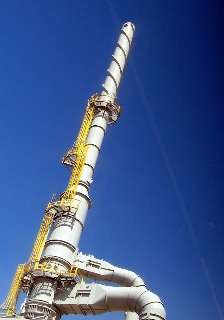RL Blogs

By Process Pro Eric
Mar 03, 2014As a process engineer, where do you draw the line between environmental responsibility and company profitability? |
||
| From the start of my career as a refinery process engineer, I’ve constantly struggled in one area. I have often found myself wondering where to make the trade-off between being very good at my job versus being a responsible resident of this planet.
In my mind, there are two areas of environmental responsibility when it comes down to operating an oil refinery. One pertains to operating the facility within permit limits, which include equipment emissions, oil
Regardless how good of an engineer I am, I choose not to optimize around permit limits because the risks far outweigh any potential reward.
On the other hand, environmental compliance with regard to product specification is a different issue. Whether it is the sulfur content in diesel fuel, or benzene content in U.S. gasoline, I find it appropriate in my mind to optimize refinery operation to the very edge of legal limits here.
Obviously I do not support making product that is off-spec, but the consequence of off-spec product only has financial consequences. Since refiners have the ability to re-blend or re-process product before it leaves the refinery gate, they have limited risk of shipping refinery product to the public that is off-spec.
As a result of this layer of protection, I find it perfectly acceptable to optimize product specifications that are driven by environmental regulations. There are tens of millions of dollars associated with refinery spec optimization, and therein lies the paradox.
I aim to be an environmentally conscious person. I recycle everything that I can, and I carpool when possible. However, these items are easy to accommodate because they are merely a matter of convenience. In my role as a refinery engineer, the option to remain environmentally conscious no longer trades off convenience, but comes at a large financial cost.
As an example of complying with environmental regulations, I recognize that my refinery must sell diesel product at the pump that does not exceed 15 ppm sulfur. As long as the diesel product meets the 15 ppm sulfur regulation, it is fully compliant with the law (assuming that all other specifications are met as well).
So what if I were to tell you that my diesel hydrotreater has the capability of producing product that can be 10 ppm, or even 5 ppm. I can reduce the sulfur content of all diesel products by nearly 70%, and the only cost to my company is a reduction in profit. Do you think that oil companies make enough profit that they should voluntarily give up some earnings to be more environmentally conscious?
What if I told you the cost would only be $1 Million dollars a year to reduce diesel sulfur by 70%? What if the cost were $5 Million, or $10 Million? Would you make your decision to giveaway product quality depending on the level of financial cost?
I’m sure that ultra-environmentalists would be in strong favor of that option. Oil companies, on the other hand, would surely support the opposite. I have never worked in any refinery where we purposely gave away on product specs just to be more environmentally friendly. Whether the cost was only $1 Million or $10 Million, it just has never happened.
So does it make me a morally challenged individual if I make every attempt to operate my equipment to the fullest capability? Or does it just qualify me as a very prudent engineer if I maximize profitability to the greatest extent while remaining in full legal compliance?
Should we always allow regulators to define the laws on what’s adequate? Do we believe that they have proper control of managing the environment? As a collective society we cannot agree on the direction of the environmental changes, so it’s not unreasonable to say that we may have it all wrong (in either direction)
After spending years of thinking, I’ve come to the conclusion that as long as I operate within the absolute confines of the law, I am comfortable with optimizing my units as much as possible to maximize profits for my company. | ||
|
|









